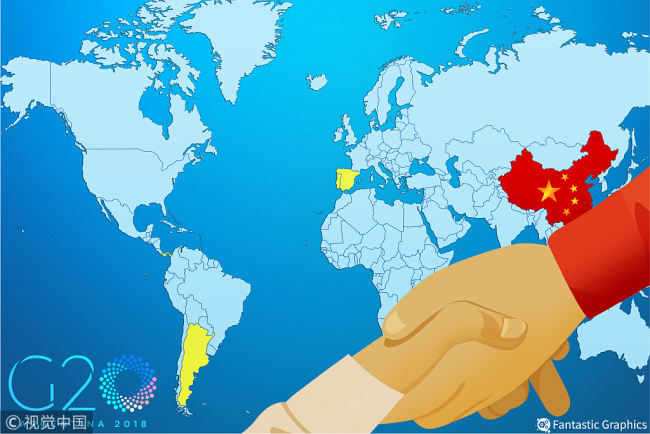Building bonds between communities with a value beyond dollars
Note: The following is an edited translation of a commentary from the Chinese-language "Commentaries on International Affairs."
China’s President Xi Jinping returned to Beijing on Thursday following state visits to Spain, Argentina, Panama, and Portugal. He also attended the G20 Leaders' Summit in Buenos Aires, and held a meeting with his American counterpart Donald Trump on trade.

China’s President Xi Jinping has returned to Beijing following state visits to Spain, Argentina, Panama, and Portugal. He also attended the G20 Leaders' Summit in Buenos Aires.[Photo: VCG]
The G20 Leaders’ Summit was held on the 10th anniversary of the international financial crisis that swept around the world in 2008, wreaking havoc in markets everywhere. Out of this disaster emerged the G20 Leaders' Summit mechanism. It is no less important today, as the world economy stands at a crossroads with one path leading to greater openness and globalization, and the other heading down a dark path towards protectionism.
A consistent theme in President Xi’s speeches at the G20 and the numerous multilateral and bilateral meetings held during his state visits was his vigorous defense of multilateralism. He proposed that international trade adhere to the three principles of openness, tolerance, and a rule-based order. As he said in Portugal, although the world faces various challenges, China will always follow the principles of mutual respect, equal consultation, and peaceful development when working towards solutions to shared problems.
In statements issued by China and Spain, Argentina, Panama, and Portugal during President Xi’s visits, the Belt and Road Initiative was a byword for mutual cooperation. This is because, at its core, the Belt and Road framework is not exclusionist – its participants are free to engage in third-party markets along with other mechanisms for cooperation. For example, Spain and Portugal are important member states of the European Union. In the joint statements China issued with Spain, and also with Portugal, there was clear support for aligning the Belt and Road Initiative with the European Union’s development strategy, known as the Eurasian Interconnection Strategy. This alignment is a possibility because the Belt and Road Initiative is designed to be a platform that promotes global cooperation and connectivity, so the two development strategies are complementary, not in conflict.
The spirit of openness and mutual respect seen in the development of China’s economic and trade ties is also reflected in its approach to building stronger bonds between the Chinese community and communities in other parts of the world. During President Xi’s visit to Panama, the two countries issued a joint statement that emphasized the importance of exchanges in fields including culture, education, health, tourism, and journalism. One of the specific measures it listed was a move by China’s government to promote Panama as a tourism destination for China’s growing number of outbound tourists. As well as driving economic growth in Panama, it will also raise the level of engagement between the people of the two countries.
This spirit of engagement can also be found in the four-year cultural cooperation plan signed by China and Argentina. It includes plans to hold a year of cultural exchange, and both sides will work to streamline visa application procedures and to promote exchanges of talent. And in Spain, Argentina, and Panama, more and more people are exploring their interest in the Chinese language and Chinese culture by enrolling in courses at a local Confucius Institute. In Portugal alone, there are four Confucius Institutes, while in China, 17 universities have set up Portuguese language courses.
The last few weeks has shown that, despite differences in geography, language, and culture, communities around the world are keen to find ways to engage with China in a positive way. This enthusiasm is clearly matched by the Chinese people, who are visiting and doing business with people in all parts of the world. We can only hope that this spirit of openness, tolerance, and curiosity can continue as the world seeks to solve the major challenges that lie ahead.






